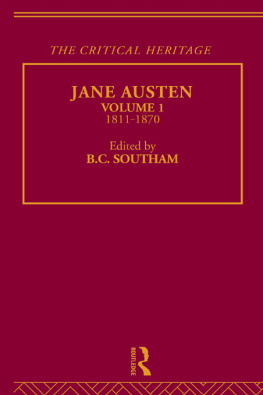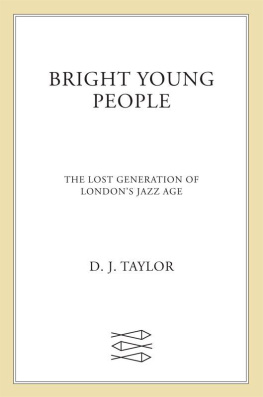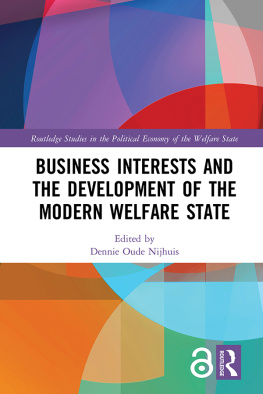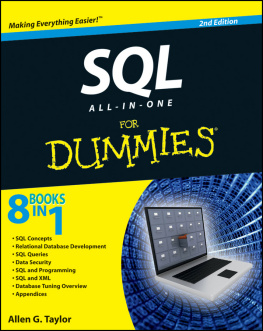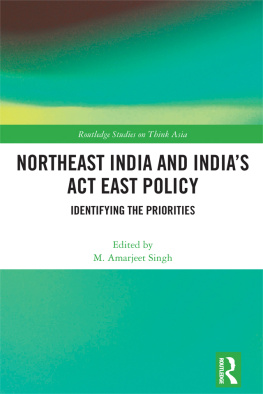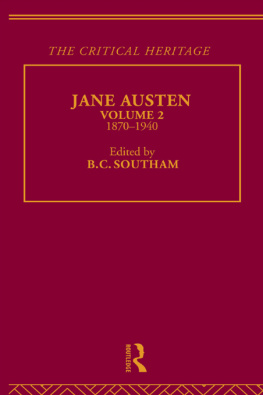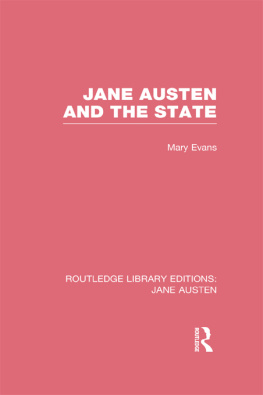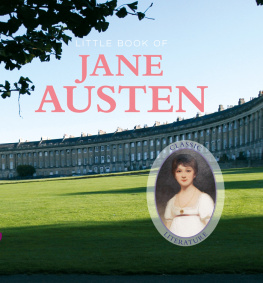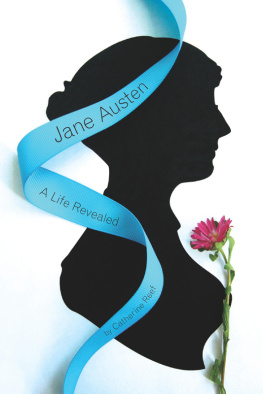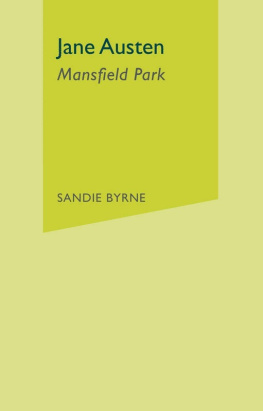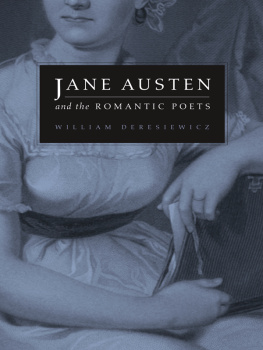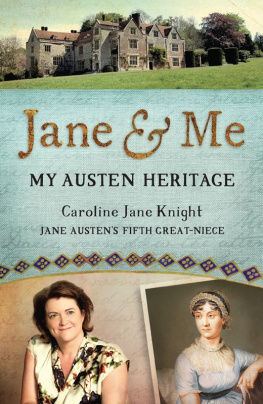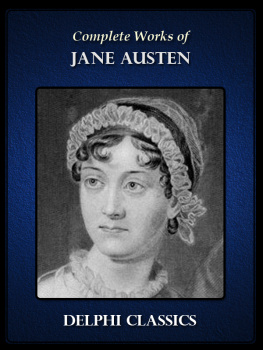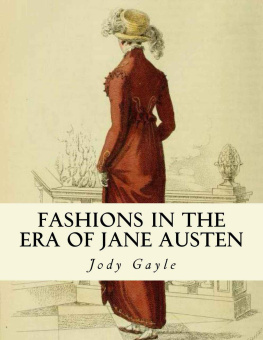Taylor - Jane Austen the critical heritage: 1811-1870
Here you can read online Taylor - Jane Austen the critical heritage: 1811-1870 full text of the book (entire story) in english for free. Download pdf and epub, get meaning, cover and reviews about this ebook. City: London;England, year: 2002, publisher: Routledge, genre: Art. Description of the work, (preface) as well as reviews are available. Best literature library LitArk.com created for fans of good reading and offers a wide selection of genres:
Romance novel
Science fiction
Adventure
Detective
Science
History
Home and family
Prose
Art
Politics
Computer
Non-fiction
Religion
Business
Children
Humor
Choose a favorite category and find really read worthwhile books. Enjoy immersion in the world of imagination, feel the emotions of the characters or learn something new for yourself, make an fascinating discovery.
- Book:Jane Austen the critical heritage: 1811-1870
- Author:
- Publisher:Routledge
- Genre:
- Year:2002
- City:London;England
- Rating:3 / 5
- Favourites:Add to favourites
- Your mark:
- 60
- 1
- 2
- 3
- 4
- 5
Jane Austen the critical heritage: 1811-1870: summary, description and annotation
We offer to read an annotation, description, summary or preface (depends on what the author of the book "Jane Austen the critical heritage: 1811-1870" wrote himself). If you haven't found the necessary information about the book — write in the comments, we will try to find it.
Jane Austen the critical heritage: 1811-1870 — read online for free the complete book (whole text) full work
Below is the text of the book, divided by pages. System saving the place of the last page read, allows you to conveniently read the book "Jane Austen the critical heritage: 1811-1870" online for free, without having to search again every time where you left off. Put a bookmark, and you can go to the page where you finished reading at any time.
Font size:
Interval:
Bookmark:

JANE AUSTEN: THE CRITICAL HERITAGE VOLUME 1, 18111870
General Editor: B.C.Southam
The Critical Heritage series collects together a large body of criticism on major figures in literature. Each volume presents the contemporary responses to a particular writer, enabling the student to follow the formation of critical attitudes to the writers work and its place within a literary tradition.
The carefully selected sources range from landmark essays in the history of criticism to fragments of contemporary opinion and little published documentary material, such as letters and diaries.
Significant pieces of criticism from later periods are also included in order to demonstrate fluctuations in reputation following the writers death.
Edited by
B.C.SOUTHAM

First Published in 1979
11 New Fetter
Lane London EC4P4EE
&
29 West 35th Street
New York, NY10001
This edition published in the Taylor & Francis e-Library, 2005.
To purchase your own copy of this or any of Taylor & Francis or Routledges collection of thousands of eBooks please go to www.eBookstore.tandf.co.uk.
Compilation, introduction, notes and index 1968B.C.Southam
All rights reserved. No part of this book may be reprinted or reproduced or utilized in any form or by any electronic, mechanical, or other means, now known or hereafter invented, including photocopying and recording, or in any information storage or retrieval system, without permission in writing from the publishers.
British Library Cataloguing in Publication Data
ISBN 0-203-19671-6 Master e-book ISBN
ISBN 0-203-19674-0 (Adobe eReader Format)
ISBN 0-415-13456-0 (Print Edition)
The reception given to a writer by his contemporaries and near-contemporaries is evidence of considerable value to the student of literature. On one side, we learn a great deal about the state of criticism at large and in particular about the development of critical attitudes towards a single writer; at the same time, through private comments in letters, journals or marginalia, we gain an insight upon the tastes and literary thought of individual readers of the period. Evidence of this kind helps us to understand the writers historical situation, the nature of his immediate reading-public, and his response to these pressures.
The separate volumes in The Critical Heritage Series present a record of this early criticism. Clearly, for many of the highly-productive and lengthily-reviewed nineteenth- and twentieth-century writers, there exists an enormous body of material; and in these cases the volume editors have made a selection of the most important views, significant for their intrinsic critical worth or for their representative quality.
For writers of the eighteenth century and earlier, the materials are much scarcer and the historical period has been extended, sometimes far beyond the writers lifetime, in order to show the inception and growth of critical views which were initially slow to appear.
In each volume the documents are headed by an Introduction, discussing the material assembled and relating the early stages of the authors reception to what we have come to identify as the critical tradition. The volumes will make available much material which would otherwise be difficult of access and it is hoped that the modern reader will be thereby helped towards an informed understanding of the ways in which literature has been read and judged.
B.C.S.
I would like to thank Messrs. Basil Blackwell Ltd. for permission to quote from The Bronts: Lives and Correspondence (1932) and the Clarendon Press, Oxford, for permission to re-print Opinions of Mansfield Park from Plan of a Novel (1926), and to quote from the Letters of Jane Austen (1952), edited by R.W.Chapman.
I must acknowledge my considerable debt to the account of Jane Austens early public by Professor C.B.Hogan, listed in the Bibliography, and to Mr. Darrell Mansell, Mr. Charles Murrah and Mr. Ioan Williams for their advice on my Introduction, and my thanks also go to Mr. Roger Morkam for his assistance in the preparation of the text.
The materials printed in this volume follow the original texts in all important respects. Lengthy extracts from the novels of Jane Austen have been omitted whenever they are quoted merely to illustrate the work in question. These omissions are clearly indicated in the text. Typographical errors in the originals have been silently corrected and the form of reference to titles has been regularized. But when Jane Austens critics have referred to Miss Austin, this indicative spelling has been allowed to stand.
A late addition is item No. 45, an 1818 notice of Northanger Abbey and Persuasion.
Anyone who turns to this volume for critical illumination is likely to be disappointed. In many respects the birth and growth of Jane Austens critical reputation was a dull and long-drawn-out affair. The contemporary reviews are pedestrian and the later nineteenth-century criticism is unenlivened by disputes or by infectious enthusiasm. Nor are there those moments of insight which occur when one great mind is engaged by anotheras when Johnson writes on Pope, Blake on Milton, or Coleridge on Shakespeare. Jane Austens novels have never commanded such a level of attention, such a degree of imaginative empathy. There are no masterpieces of criticism in this volume. That said, however, there are certain, limited claims to be made on behalf of the material collected here. The case of Jane Austen is more than that of a single author. Her novels revealed to the early nineteenth-century reading public that fiction was capable of unsuspected power, that it was to be taken seriously as a form of literature, and that criticism of the novel could itself be a serious intellectual activity. In this respect the documentation of Jane Austens contemporary reputation is important to our understanding of the rise of the novel in critical esteem.
On the other hand, it is evident enough from this book that the quantity of material is small. Only twelve contemporary reviews and notices are known to us, and even down to 1870 the record is sparse: fewer than fifty articles mention Jane Austen at any length and of these only six take her as the principal subject. After 1870 the situation takes a sudden change. In the space of two years there was a greater quantity of periodical criticism than had appeared in the previous fifty. This change was effected by the first book on Jane Austen, the Memoir by her nephew James Edward Austen-Leigh, published in 1870the terminus date I have chosen for the documents in this volume.
But the 1870 terminus is not merely a matter of convenience, with regard to the quantity of material; it is also a significant date with regard to the quality and kind of attention that Jane Austen received from her Victorian critics and admirers. The Memoir draws an engaging portrait of dear Aunt Jane, the authoress of charming love-stories spiced with humour. This picture fed a growing interest in the authors life and times and encouraged a cult of appreciation in which biographical details and literary commentary were easily and uncritically mingled. In 1870 there also appeared a totally different view, in an essay by the Shakespearian scholar Richard Simpson. Simpsons Jane Austen is a genius, in outlook essentially critical, limited in her scope, yet remarkable for the power of irony with which she searches the conduct and values of her society. Simpsons view had no antecedents and no immediate following. It awakened no response in Victorian thought and for many years this understanding of the novelists controlling irony played no part in the discussion of her art.
Next pageFont size:
Interval:
Bookmark:
Similar books «Jane Austen the critical heritage: 1811-1870»
Look at similar books to Jane Austen the critical heritage: 1811-1870. We have selected literature similar in name and meaning in the hope of providing readers with more options to find new, interesting, not yet read works.
Discussion, reviews of the book Jane Austen the critical heritage: 1811-1870 and just readers' own opinions. Leave your comments, write what you think about the work, its meaning or the main characters. Specify what exactly you liked and what you didn't like, and why you think so.

